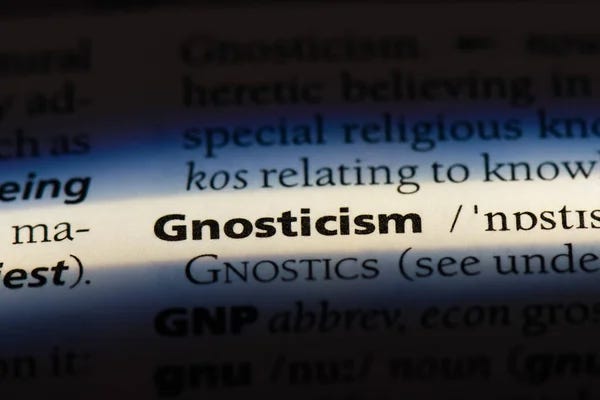There are many versions of Christianity and many competing gospels in America. It’s a shame, but it’s true. Some things are across the board true—Jesus dying on the cross for our sins comes to mind. But other things get dropped off, and reduced because of a deficient understanding of the gospel and what it does.
One area where this gospel reduction has had significant consequences is in how we understand the body. For example, “I often hear the phrase, ‘My genitals don’t define me!’ from those within the LGBTQ+ community. When you consider that more than half of LGBTQ+ adults come from a Christian background,1 it raises an important question: What led to this shift? Was it something intrinsic? A lack of teaching? Or perhaps a response to personal experiences? Likely, it’s a combination of factors—an innate sinful nature, insufficient teaching on the goodness and purpose of the body, and the absence of guidance from parents and pastors. Many have lacked compassionate, biblical counsel on navigating these struggles, leading either to indulgence or harsh condemnation, neither offering Christ’s love and truth.
Addressing all of the factors is beyond the purpose of this article, but one of the factors I would like to examine traces back to an improper understanding of the gospel and the product of an ancient heresy. Heresy is not a word I use lightly. It vacillates between overuse or underuse and rarely is it in between. It’s either used to villainize anyone on an opposing side of a given issue or is invoked and exiled at the altar of Christian unity. Nevertheless, it is a term that needs to be used and must be used. No other term will suffice to communicate the dangerous elements infecting many streams of evangelical Christianity today. It’s a heresy that denies the goodness of creation and the purpose of the body; it’s the heresy of Gnosticism.
Gnosticism is difficult to define because it lacks a single authoritative text; instead, it is a mindset that subtly shapes how we view the world. Gnosticism reminds me of how my seminary professor David F. Wells once defined worldliness, “it’s anything that makes sin look normal and righteousness look strange.” Despite not having one authoritative book, and the vague thoughts surrounding Gnosticism, it does possess a set of characteristics. Space does not permit addressing all of them, but a few of them overlap with where we are at today.
-
Secret knowledge: The term “Gnosticism” comes from the Greek word gnosis, which means “knowledge.” Gnostics believe that they could obtain a secret, special knowledge of spiritual truths that could lead to salvation.
-
Dualism: Gnostics possessed a strong dualistic worldview that separated the divine spirit world from the material world, often portraying the material world as evil or inherently flawed but the spirit world as pure and good.
-
Salvation Through Escape: Gnostics believed that salvation was found in escaping this evil material world and that escape was through adhering to the secret knowledge.
-
View of Humanity: Gnostics also believed that humanity contained a “divine spark” within them that was their true self or spiritual essence that was trapped by the physical body.
How do these four characteristics of Gnosticism influence us today? How have they helped shape evangelicalism? How can we notice it in ourselves?
If you had told me that I was a Gnostic or been influenced by Gnosticism, I would have vehemently denied it—and likely looked at you in disbelief. After all, I believed in Jesus and the exclusivity of salvation through Him alone held fast to His Word, was devoted to expository preaching, preached against sin, emphasized holy living, and refused to compromise with worldliness. Yet it wasn’t until I saw how the gospel was being lived out in the lives of those in my church that I began to notice cracks in my understanding and the deficiencies in my theological system that my eyes started to open.
C. Vaughn Doner, once a prominent evangelical leader deeply involved in various causes and holding key positions within evangelicalism, experienced a similar awakening. Over time, he began to recognize troubling patterns within modern evangelicalism—shifts that reflected a departure from historic Christianity. In The Late Great Evangelical Church, he identifies several key distortions that have reshaped the faith:
-
reduce the gospel from a message of holistic redemption of the entire cosmos, graciously including fallen men and women, to a message of mere personal peace and individual salvation;
-
restructure the ‘24/7’ Christian lifestyle of the historic community to a ‘part-time’ compartmentalized mentality;
-
relocate authority from scholars, church leadership, and historic orthodoxy and creeds to theologically untrained individuals;
-
obliterate the importance and vitality of community in favor of the interests of the ‘sovereign’ individual;
-
refocus the church’s historic mission from service and stewardship (acting as salt and light) to the cultivation of individual piety, resulting in the marginalization of our ability to impact culture;
-
promote cultural disengagement through a dualistic/separatist mentality;
-
marginalize the physical creation and its God-given pleasures; and
-
reinforce at Evangelicalism’s margins–particularly within its charismatic wing–a tendency to retreat within the walls of an ideological ghetto replete with cultish buzzwords and phraseology, disturbing illusions, and magic-like use of scripture proof texts.2
He goes on to note that such beliefs about the world shape a mindset about the world,
“At an ever-deepening, subconscious level, an age-old Gnostic mindset has provided our reference points for determining truth and value, our presuppositions about our life and faith, even our interpretation of scripture and the world around us. It has molded our perceptions of God, others, and ourselves, proscribed our limits and established our priorities.”3
Doner’s assessment was played out for me over 20 years in pastoral ministry. It was true for me and in my churches and affected everything we did, the counsel we gave, the texts we preached, and how we engaged the world. It was not that we didn’t believe in Jesus and the salvation He brings through His atoning death on the cross and resurrection from the dead. We did. It’s not that we didn’t believe in the Bible. We did, but it was what we believed about the Bible and what parts were relevant for us today that caused us a series of problems. As Doner details,
“For too many in the Evangelical world, redemption is about one thing: saving individual souls. That’s it. That’s all. No more. But is that what the Bible actually says? Or is the good news of the gospel for all of God’s creation, calling us to follow Christ as our Lord and Savior and to assess our holiness by obedience to God’s Great Commission; our commitment to love others through caring service; our stewarding of God’s good creation; and otherwise utilizing our resources to expand his kingdom, bringing all things to obedience to Christ?”4
It’s not like Gnosticism came out of nowhere and stepped into the driver’s seat of my life or the church. The theological system I inherited was premillennial dispensationalism, and it simply codified Gnosticism in theological and biblical language. I was unaware at the time, but that system denied various elements of the Christian faith because it superimposed a foreign framework upon it that has decimated the public life of generations of Christians, but that is for next week.
The issue that many Christians have is not that they have a Gnostic gospel, or Gnostic influences in their understanding of the gospel (they clearly do), but such little understanding of church history and the history of interpretation that has left them vulnerable and exposed to all kinds of heresies. Many evangelicals believe that their church today is simply a faithful extension of the New Testament church that has passed down through history without blemish or history, but that is far from truth. It is arrogant and foolish, and actually loses the full flavor and framework that determines what the gospel is and what it does, as Doner notes,
“A latter-day consequence of this dualism is that many Evangelicals influenced by the ‘restoration’ or ‘primitivist’ movement (‘restoring’ the church to its early first-century purity) curiously expend little or no effort studying the Old Testament, which of course was the only ‘scripture’ the early church possessed! When Paul said that all scripture is given for our edification, he was talking about the Old Testament and not his or the other apostles’ letters, which were not even confirmed as part of the canon of scripture until the church councils of the late fourth century. This fact is lost on most Evangelicals who seem to think that church history began with the founding of their local church (or, if they’re really thoughtful, their denomination) and treat the Bible as if it had magically materialized in one neat package (complete with Scofield’s notes) and contemporaneous with the twelve apostles.”5
Let me be plain at what Gnosticism has done to the Christian faith and evangelicalism.
Redefined the gospel. By focusing on a heaven-only gospel, it has rendered the entire framework of creation and the full biblical vision of the renewal of creation, the coming of God’s kingdom, and the church’s role in that renewal as obsolete. Church becomes a place of goods and services and your faith is reduced to the private realm.
Rejected the body. By focusing simply on saving souls, the body has no relevance or purpose, leaving a person susceptible to gender ideology unaware of what role the body plays in our personhood and role in God’s kingdom.
Relegated cultural engagement to the realm of the worldly – By emphasizing an escape from this world through the rapture, or just going to heaven, only souls were considered valuable, while everything else was dismissed as superfluous and unnecessary, thereby deeming participation in public life as worldly and insignificant.
What makes Gnosticism so slippery is that it looks and sounds like biblical Christianity. It is propagated by charismatic preachers of megachurches, published by major evangelical publishing houses, written about in Bible colleges, and shared by missionaries, and uses Bible verses to justify itself.
What makes Gnosticism so dangerous is its subtlety—it looks and sounds like biblical Christianity. It is preached from pulpits, published by evangelical publishing houses, taught in Bible colleges, and spread by well-meaning missionaries, all while using Scripture to justify itself. This is what made the early Gnostics so difficult to detect—they claimed to be Christians. The same is true today.
At its core, Gnosticism is a redefinition of the Christian faith, stripping it of its fullness. It’s not that what is taught in modern churches is completely false—it’s that it’s not true enough. Key parts of the biblical story are left out, and when the larger story is lost, so is the fullness of the gospel.
The only cure for Gnosticism is a recovery of God’s kingdom story. The gospel must be framed by the broader biblical narrative—creation, redemption, and renewal—so that we can rediscover its holistic nature. That’s where missioholism comes in.
Missioholism is a gospel-centered, mission-framed, and holistically healthy approach to ministry and the Christian life. It begins with a proper understanding of the gospel, rooted in the grand story of God’s kingdom. From this foundation, the church—God’s distinctive, transcultural community—is empowered to engage the culture for Christ rather than retreat from it.
To assess whether the gospel you’ve inherited—or the gospel your church promotes—is the full biblical gospel, you can use the Missioholistic Diagnostic Test (MDT). This tool asks four key questions to evaluate how the gospel has been understood and lived out in a specific context over time. By examining its real-world effects, the MDT helps individuals and institutions determine whether their gospel expression aligns with biblical faithfulness.
Four Key Questions of the Missioholistic Diagnostic Test (MDT):
-
Does this gospel lead to salvation that produces a godly life across cultures and worldviews? (Does it truly transform lives, or is it a cultural adaptation that only appeals to certain groups?)
-
Does it create a distinctive, transcultural community that embodies the new creation? (Is the church diverse, countercultural, and a reflection of God’s kingdom, or is it shaped by worldly divisions?)
-
Does it result in a better humanity, conforming people to Christ as the true human? (Is discipleship forming people into the image of Jesus or just reinforcing individualistic spirituality?)
-
Does it engage the culture in a way that challenges idolatry and seeks the common good? (Is the church actively shaping and engaging the world, or retreating from it?)
If all four questions can’t be answered in the affirmative, then there is a deficiency. We will see the MDT throughout this series because it evaluates not only our churches and institutions today but also past expressions of the gospel that we have inherited. We must unmask Gnosticism whenever we find it, and if we fail in this task, we will continue to preach a gospel that is truncated, individualistic, and powerless to transform lives and cultures. But if we recover the full gospel of the kingdom, we will see the church become what it was always meant to be—a people who embody Christ’s reign in every sphere of life, proclaiming not just salvation for souls but the renewal of all things in Him.
Next week we will examine one of the theological frameworks where Gnosticism is most found—premillennial dispensationalism.
Pew Research Center, Chapter 6: Religion, June 13, 2013, https://www.pewresearch.org/social-trends/2013/06/13/chapter-6-religion/, accessed February 6, 2025.
C. Vaughn Doner, The Late Great Evangelical Church, p. 268.
Ibid.
Ibid., p. 70.
Ibid. p. 76





